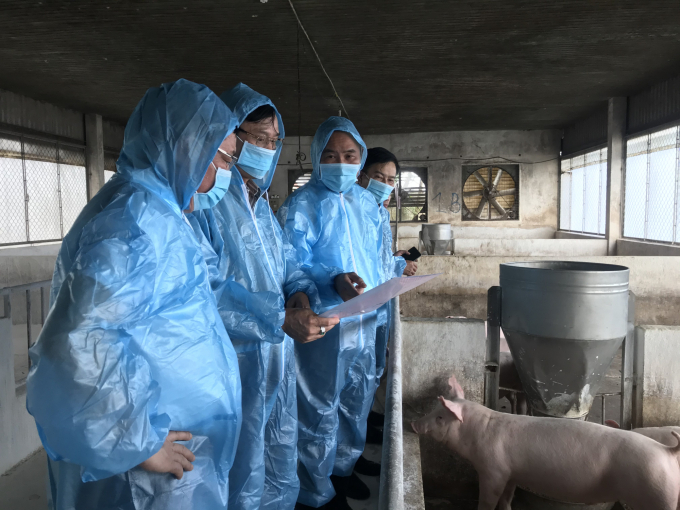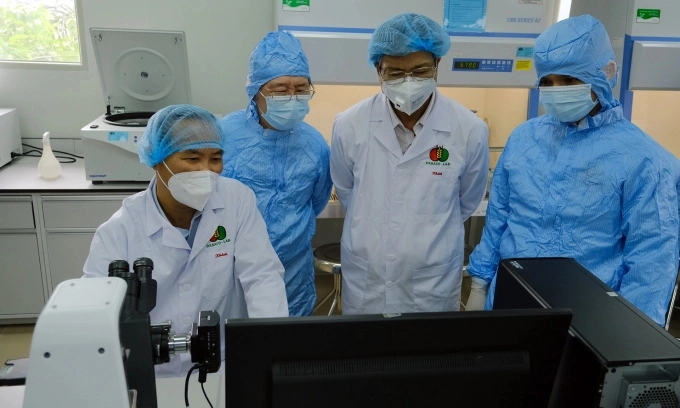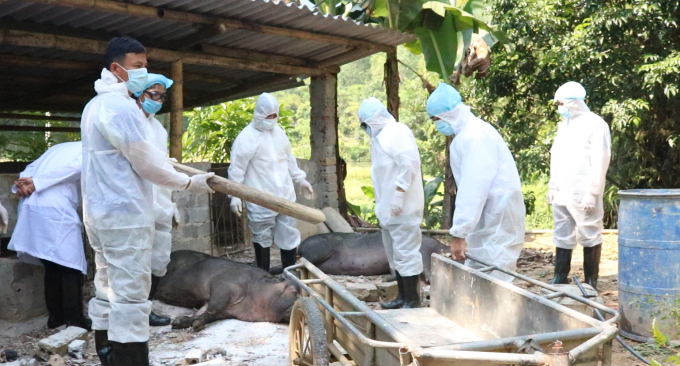
The Ministry of Agriculture and Rural Development delegation, led by Deputy Minister Phung Duc Tien, tested the results of the African swine fever vaccine. Picture: BT.
Risk of recurrence of dangerous animal diseases
In the official letter No. 5064/BNN-TY just sent to the Prime Minister, the Ministry of Agriculture and Rural Development informed that the risk of African swine fever epidemic and its widespread spread in the coming period is very high.
Six reasons lead MARD to this verdict. First, the ASF virus has the ability to survive in the environment for a long time, the route of transmission is very complicated.
Secondly, Vietnam’s border is very long, resulting in a risk of infectious diseases from trade, transportation and commercial activities with other countries.
Third, housekeeping still accounts for a large share, while biosecurity, proactive hygiene and disease prevention measures are not guaranteed in smallholder households.
Fourth, the weather is seasonal, with lots of rain, storms and flooding. Fifth, the veterinary system changed at all levels, which affected the organization of animal disease prevention and control.
Sixth, the disease detection and notification was not carried out according to the regulations due to the lack of a policy to support the killing of pigs, which led to the spread of the disease and prolonged involvement.
In 2021, African swine fever occurs in 2,623 communities in 418 districts of 60 provinces and cities. The total number of pigs infected, dead and destroyed was 299,878. From early 2022 to date, African swine fever has spread to 841 communities in 246 districts of 48 provinces and cities, with 41,804 pigs culled. Currently, the country has 117 outbreaks in 49 counties of 16 provinces and cities, less than 21 days.
To prevent and control African swine fever, the Department of Agriculture and Rural Development, the Department of Animal Health and units under the Department of Animal Health regularly and continuously establish working groups to guide and assist key sites.
In addition, the Ministry of Agriculture and Rural Development has sent out many documents urging the people’s committees of the provinces and cities where the ASF epidemic is occurring on a large scale to focus on controlling and preventing the outbreaks from reoccurring . Immediately overcome difficulties, deficiencies and inadequacies in disease prevention and control.

Deputy Minister of Agriculture and Rural Development Phung Duc Tien (far left) inspects the production and preparation of African swine fever vaccines. Picture: BT.
Strengthening the capacity of the veterinary system
By summarizing local reports, the Ministry of Agriculture and Rural Development found that animal disease prevention and control mechanisms and strategies are still insufficient and unrealistic. In particular, since 2021 to date, there have been no mechanisms and strategies to support the prevention and control of African swine fever.
In order to effectively prevent and control diseases, including African swine fever, the Ministry of Agriculture and Rural Development has consolidated disease prevention and control steering committees at all levels. Set up working groups to visit epidemic-affected places directly to check, urge, guide and coordinate with local authorities to organize measures to deal with the outbreak thoroughly.
Application of cleaning and disinfecting solutions containing chemicals and lime to kill pathogens at disease hotspots, pig treatment and burial sites, high-risk areas, tools and transportation for sick pigs and people.
The agricultural sector has also implemented many surveillance plans to provide early detection and prompt treatment of infected pigs suspected of having African swine fever. Strict treatment of cases where the disease is not reported, sells well, slaughtered, diseased or suspect pig carcasses are disposed of in the environment; timely and complete report on the epidemic situation; to publicize and organize disease control in accordance with the Veterinary Medicine Act.

An estimated 6 million pigs were culled in 2019 due to African swine fever. Photo: BT.
In addition, the Ministry of Agriculture and Rural Development has recommended and organized the implementation of a month-long general cleaning and disinfection to destroy pathogens in the environment, especially in places with high livestock density, collection points and trading places where animals are sold and slaughtered, the place of discovery common in African swine fever.
At the same time, implement plans to control the movement of pigs, especially the movement and trade of pigs for commercial rearing and pigs to slaughterhouses, to prevent the risk of disease recurrence and spread. Monitor, detect and deal strictly with cases of illegal transport of pigs and pig products.
In the long term, the Ministry of Agriculture and Rural Development recommends consolidating and strengthening the capacity of the system of specialized veterinary management agencies at all levels, especially at the district and municipal levels, in accordance with the Veterinary Medicine Law, to ensure adequate resources to organize anti-epidemic. In addition, management authorities need to increase information and propaganda in various forms about the danger of ASF, the risk of recurrence and spread of the disease, and measures to prevent the disease.
Soon to help people cull sick animals
On June 8, 2022, the Department of Agriculture and Rural Development issued Official Letter No. 3646/BNN-TY to the Ministry of Finance proposing Mechanisms and Policies to Support the Damage Caused by African Swine Fever and Eczema. On July 25, 2022, the Department of Treasury issued Official Letter #7217/BTC-NSNN for Consultation on Mechanisms and Policies to Support Damage Caused by These Two Diseases.
Accordingly, the Ministry of Finance approved the proposal of the Ministry of Agriculture and Rural Development to submit to the Prime Minister for consideration and approval the application of mechanisms and strategies to support damage caused by natural disasters and epidemics in Decree No. 02/2017. ND-CP of 01.09.2017 of the government to support farmers whose pigs have to be killed because of African swine fever and buffalo and cows because of neurodermatitis in the course of 2021 and 2022 in localities from the time of killing above circulars take effect.
At the direction of the Prime Minister, the Department of Agriculture and Rural Development commits to issuing documents to assist communities in implementing measures to support production households whose cattle are suffering from cholera, African swine fever, eczema and other diseases (if any), Ensuring coherence in the nationwide organization of policy implementation.

